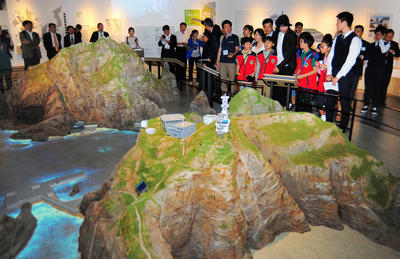Nevertheless, in a short, unofficial meeting on the sidelines of the APEC Summit, Lee and Noda agreed to work toward future-oriented bilateral relations. Their conversations followed urging from US Secretary of State Hillary Clinton to ‘lower the temperature and work together in a concerted way to have a calm and restrained approach’ to the issue.
On the surface, tempers between the two American allies over the disputed islets appear to be cooling. But, a closer look reveals a complex tangle of political, economic, historical, legal, geographical and emotional issues, and it is clear that there is no silver bullet to solve the dispute. Still, it is a welcome development that the US, which has maintained a neutral, hands-off position on the issue for decades, is seemingly willing to discuss it. America has recently paid renewed attention to the region under its ‘pivot to Asia’ to counterbalance the rapid rise of Chinese power. Under current circumstances, the US has a strong interest in reinforcing its relations with existing allies in the region and promoting trilateral cooperation between South Korea, Japan and the US. The US is unlikely to show much patience if relations between South Korea and Japan continue to deteriorate in the face of Chinese advancement in the region.
Australia is not immune to these tensions. Australia has similar strategic interests in the region, which could be harmed by the current tensions between South Korea and Japan. South Korea is Australia’s fourth-largest trading partner and the third-largest export destination for Australian commodities. Japan is the second-largest export destination for Australian commodities and the largest surplus-producing trading partner to Australia. Australia shares democratic and free-market values and a history of close cooperation on many regional and international issues with both South Korea and Japan, including concern over North Korea’s development of nuclear weapons. Any escalation of tensions between South Korea and Japan could potentially undermine goodwill built up over time by Australia with both countries.
So what can be done? On the one hand, Japan started to publicly claim sovereignty over the islets amidst re-emergence of nationalism in North East Asia in the post-Cold War period. On the other hand, Korea has emphasised that Dokdo was a victim of Japanese imperialism at the time of the Russo-Japanese war in 1905. Since Korea’s independence from Japan after World War II, Dokdo has been South Korea’s most important and visible symbol of national sovereignty. Japan’s attempts to claim the islets have served as a very painful historical and emotional reminder of Korea’s past as a Japanese colony. There is no doubt that domestic political factors play a role in the stubborn actions of leaders from both countries, particularly at election time; however, they should bear in mind that the future strategic interests of both countries cannot be served with short-term public provocations.
For decades, Japan has insisted that the dispute should be resolved through the International Court of Justice (ICJ), but this is not likely to be a viable solution. Japan is aware that legal proceedings at the ICJ require South Korea’s consent under international law. Politicising the matter by taking it to the ICJ will likely only force South Korea to react with strengthened measures to further reinforce its de facto jurisdiction over the islets. Disrupting the status quo by politicising the issue in the international or domestic arena would not serve Japan’s intended purpose and would only further destabilise the region. Japan has clearly experienced this in its recent territorial dispute with China over the Senkaku/Diaoyu Islands in the East China Sea, where the issue has been too politicised to maintain the status quo due to intense public provocation on both sides.
Countries like Australia and America, which have significant strategic interests in the Asia Pacific, should continue to voice concerns about the long-term impacts the tensions have on the entire region. Since the root of the dispute over Dokdo/Takeshima is embedded in Japanese colonial history and the role it played in Korea’s history, finding ways to overcome that legacy is an important first step toward promoting positive relations and finding a long-term solution. Just as Germany has had to play a leadership role in Europe by acknowledging and overcoming its past, Australia must help Japan address its past so that it can focus on playing a positive role in an East Asian alliance.
Jeffrey Choi is a PhD candidate at the School of Politics and International Relations, the Australian National University.


Perhaps Mr. Choi could suggest specifically just what measures Japan could take that would satisfy the South Korean desire for apology over WWII crimes. The feeling in Japan is very strong that the goalposts are always being moved. At what point does South Korea say, “If you are sincere and make these reparations, SK children will be taught about the colonialization, but will also be taught that Japan has made amends”?